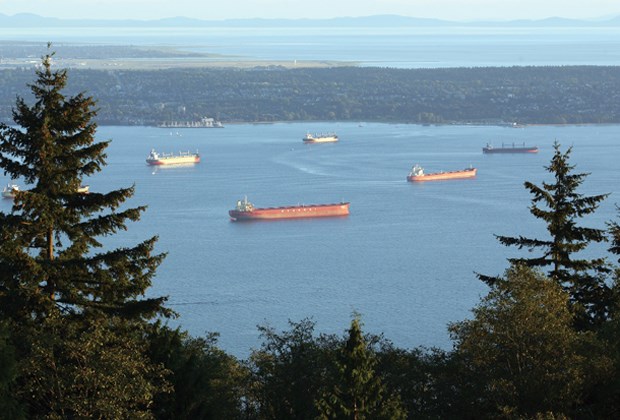As Burnaby protesters and Kinder Morgan square off in court over the Trans Mountain pipeline, the North Shore's First Nations have been making their case directly before the National Energy Board (NEB).
Squamish Nation hereditary chiefs and elders spent a half-day Oct. 24 testifying before the NEB panel, which will eventually recommend to the federal government whether Kinder Morgan's plan to triple the amount of oil pumped to and shipped from Burrard Inlet should go ahead.
The testimony, delivered by Chief Ian Campbell, elder and Chief Dick Williams and elder Dave Jacobs, sewed together the nation's oral history, the Squamish people's means of generating wealth and their deep opposition to the expanded transport of diluted bitumen and unfairness of the NEB process.
"We were primarily focused on the continuity of cultural uses and our traditions and our values associated with our lands and our waters throughout our territories including Burrard Inlet and out into the Salish Sea," Campbell said. "We also explained that we don't consent to Canada claiming jurisdiction over our territory, arbitrarily issuing rights to third-party interests on top of our aboriginal rights and title and we don't consent to Kinder Morgan's application to bring this type of risk into our waters and into our lands." Campbell said the presentation also addressed the long-term sustainability of how the Squamish Nation sees the land and waters being managed.
Squamish chiefs and council intend to see Burrard Inlet and Howe Sound revitalized, building on a boom of returning aquatic life in recent years. That can only be jeopardized by bringing in more diluted bitumen, said Campbell, adding the nation feels it is an unacceptably dangerous product.
"We did visits up to the tarsands and Fort McMurray. We weren't impressed with the magnitude of industrialization there, the impacts to the water table, the health of First Nations there. Diluted bitumen is loaded with all types of chemicals," he said.
And a spill of some kind is a question of when, not if, Campbell said. "We've moved well beyond the issue of probability to one of consequence and asking what is in place in the event of a major catastrophe, spill, rupture, leak or any seismic activity or any shipping incidents," he said. "This rhetoric that we're hearing about world class safety really doesn't resonate with us when we delve deeper into those definitions."
Meanwhile, Campbell said the Conservative government continues to promote oil sands development abroad when the Crown has failed to properly consult with the Squamish Nation.
The National Energy Board panel is expected to hear from dozens of interveners in the coming months. The NEB is scheduled to make its recommendation in January 2016.
"I'm not sure how the panel members are going to weigh or use oral evidence submissions. I'm not sure what that means to them but certainly it was an important step for us to affirm on-therecord this type of history of our people," Campbell said.
The Tsleil-Waututh Nation made its presentation to the NEB panel on Oct. 17.



